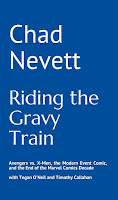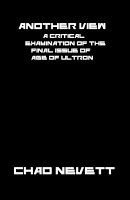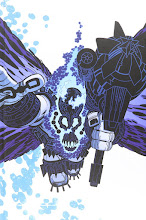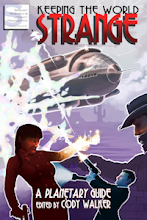Here's a brief outline of my presentation. If you'd like a copy of the entire presentation, let me know here and I can email you my powerpoint.
I started off by reading the first paragraph of my abstract as an introduction, and then I moved on to discuss some examples in other media of truth and fiction being blurred (A Million Little Pieces by James Frey, "How to Tell a True War Story" by Tim O'Brien, the Assume the Position HBO specials by Bob Wuhl). I continued by discussing the rise of the "graphic memoir" in the mainstream, citing examples of Persepolis, Blankets, and Fun Home.
I then summarized the story itself as follows: Chester Brown's new issue of Yummy Fur features an autobiographical story called "Helder." It shows his encounters with a former housemate named Helder who is an abusive bully. Chester runs into problems, however, when he seeks out feedback on the story from his friends. Their opinions vary, some of them telling him to print the story as is and others challenging its veracity. (I contrasted this explanation with two images, the first from "Helder" showing the character Helder being a bully and the second from "Showing Helder" showing one of his friends objecting to the scene depicted on the previous page.)
I talked about how the story catalogues the changes he made to the story "Helder" between its original draft and final publication. The cover image in fact from the issue of Yummy Fur containing "Showing Helder" shows Chester making a change to a page from "Helder." It's very metafictional, and the first inclination is to make you wonder if he's simply documenting his creative process. But you also think that perhaps he's simply bringing the story closer to reality, because the changes he makes are always to remove panels of narration in which he talks directly to the audience, which of course would not have happened in real life. (These also don't work from a storytelling perspective, because he is TELLING his audience things he has already shown them, a prime example of a word-picture combination Scott McCloud refers to as "duo-specific.")
I then analyzed why he asked so many people for input on the story's content, a total of five different people during the course of the story (two of which, oddly enough, were in a scene Chester cut from the final draft of "Showing Helder" that eventually saw print in the collection The Little Man, to continue the metafictional maze). Is he searching for validation? When one friend Mark disagrees with him about the story, he seems rather dismissive. Or is he seeking to bring his story closer to the truth? Again what he seems most focused on (and in fact asks EVERYONE about specifically) are the moments of narration, which didn't really happen and are simply a stylistic choice. Perhaps he is already uncomfortable with this device because it is not "true" enough for him.
I turned my attention to Chester's friend Kris next, whose opinion was the most problematic. She takes issue with the way he has drawn her at one point, and he tries to please her by agreeing to redraw that part. Is he allowing his artistic vision, his interpretation of the "truth," to be corrupted then, or is he simply trying not to offend his friend? In one scene he quibbles with how he has depicted one scene she was present for, and he argues that what is on the page is how he remembers it. Thus, by not making the changes she suggests to this scene, he is acknowledging that perhaps his interpretation of events is faulty (because he only has his senses and his memory to rely on, both entirely subjective) and he is asserting that his vision for the story will be the one he puts forth. Does that make his version right and hers wrong? I don't think he means to say so, simply to say that that is all he can do is be true to his version of events.
I suggested then that the final scene, in which Kris tells Helder that she doesn't like the narration but later admits (after he has gone about removing the narration) that this was a lie she told only to prove that he never listens to her, this scene shows Brown's true intent with "Showing Helder." In the end he DID publish the story without the narration (perhaps because he had already made the changes and didn't want to go back and redo the pages again or perhaps because he had a growing distaste for the device in his storytelling, since he similarly removed a great deal of his narration from the longer story "Fuck" when it was eventually republished as I Never Liked You). But by publishing "Showing Helder" he got to have his cake and eat it too. His audience is now aware of the version of the story which had narration, and it is up to US then to decide which version is more real to US.
I started to wrap things up by pointing out that any autobiographical comic is automatically going to be distanced from reality simply for the fact that it is DRAWN, an artist's rendering. I showed a photo of Chester next to pictures of him as illustrated by Seth, Joe Matt, and Chester himself. I then proposed that none of these were the REAL Chester Brown, merely captured images filtered through a variety of lenses, much like how each person's interpretation of the murder at the center of the film Rashomon could never add up to an approximation of what "truly" happened. I continued by illustrating how Chester tends to be his own worst critic, both personally (in his analyses of his masturbation habits in The Playboy and his failed childhood romances in I Never Liked You) and professionally (as seen in this story when he is at first pleased with a page but upon rereading the entire story feels it's horrible and that he might need to run an Ed the Happy Clown story (representing an artistic step backwards in many ways) instead.
The conclusion then draws all these ideas together by turning to the notes on "Showing Helder" in the back pages of The Little Man. In that note he explains that after this story he stopped telling autobiographical stories in the present day, for fear of offending his friends (since Kris took even more offense at her portrayal here). But I stated that I felt this decision really reflected his desire to ensure his version of events remained pure, because he did choose to continue telling autobiographical stories; he simply started telling stories of his childhood because he had lost touch with his friends from back then and none of them could complain about their portrayal. However, he did start the practice of publishing copious notes in the back of his TPBs, detailing how his version of events may have deviated from "reality" (a tradition he continued on through the historical book Louis Riel actually). This way he could again freely admit his version was simply his version, a subjective look at the events portrayed, and let his audience decide what to believe, laying culpability firmly in our laps.
(I had a lot more to say about the story too, but I had already talked for thirty minutes when I was only supposed to speak for twenty, so I cut things short at various points during the presentation. If anyone has questions, please ask and I'll be happy to elaborate.)






